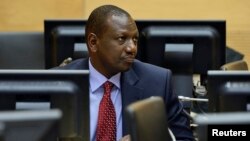Kenya’s Deputy President William Ruto goes on trial at the International Criminal Court (ICC) Tuesday on charges of involvement in violence that left about 1,300 people dead.
The ICC accuses Ruto and President Uhuru Kenyatta of human rights abuses through involvement in Kenya’s 2007-2008 post-election violence that left about 1,300 dead and hundreds of thousands displaced from their homes.
Also going on trial Tuesday is former radio host Joshua Arap Sang, who is also accused of involvement in the deadly violence.
ICC spokesman Fadi El-Abdallah says the court will respect both Kenyatta and Ruto amidst demands by some Kenyan lawmakers that the two leaders be accorded special treatment because of the high office they hold.
“We are very respectful of each and every suspect or accused that is present before the ICC, and we take all the appropriate measures to ensure the dignity and the wellbeing of the suspect and accused during their stay before the court,” said El-Abdallah.
“The ICC authority is exercised inside its own premises, but outside of the premises, it is a matter that is under the authority of the Dutch state,” he said. “So, any kind of practical arrangement that will be necessary, it is discussed directly between the Kenyan authorities and the Dutch authorities.”
El-Abdallah says Ruto, Sang and President Kenyatta are free persons who would be appearing before the Hague-based court on a voluntary basis. The court, he says, has not issued arrest warrants against them.
Kenya signed the Rome Statute recognizing the ICC’s authority in 2003. But, last week, Kenya’s parliament passed a measure that seeks to enable the East African nation to withdraw as a state party to the ICC.
The Rome Statute stipulates conditions under which a state party can withdraw its membership.
“The withdrawal cannot be effective before one year of the notification of withdrawal of the United Nations Secretary General. And even after this one year, the obligations that are on the state parties that are a result of ongoing investigations or proceedings that have started before the date when the withdrawal becomes effective, these obligations remain,” said El-Abdallah.
Last week, the ICC ruled that prosecutor Fatou Bensouda can add two additional witnesses to her list in the case against Deputy President Ruto. This came after two witnesses withdrew from testifying before the court citing family issues, safety and security concerns.
Analysts say the witnesses’ withdrawal poses a significant challenge to the prosecutor in her case against Ruto. El-Abdallah says the ICC takes the protection of witnesses seriously, and warned that it is illegal to coerce or prevent witness from testifying at the court.
“The ICC offers very solid protective measures to our witnesses,” said El-Abdallah. “Interfering with the witness is a crime, and this can be prosecuted both under the ICC statute and on the national laws.”
The ICC accuses Ruto and President Uhuru Kenyatta of human rights abuses through involvement in Kenya’s 2007-2008 post-election violence that left about 1,300 dead and hundreds of thousands displaced from their homes.
Also going on trial Tuesday is former radio host Joshua Arap Sang, who is also accused of involvement in the deadly violence.
ICC spokesman Fadi El-Abdallah says the court will respect both Kenyatta and Ruto amidst demands by some Kenyan lawmakers that the two leaders be accorded special treatment because of the high office they hold.
“We are very respectful of each and every suspect or accused that is present before the ICC, and we take all the appropriate measures to ensure the dignity and the wellbeing of the suspect and accused during their stay before the court,” said El-Abdallah.
“The ICC authority is exercised inside its own premises, but outside of the premises, it is a matter that is under the authority of the Dutch state,” he said. “So, any kind of practical arrangement that will be necessary, it is discussed directly between the Kenyan authorities and the Dutch authorities.”
El-Abdallah says Ruto, Sang and President Kenyatta are free persons who would be appearing before the Hague-based court on a voluntary basis. The court, he says, has not issued arrest warrants against them.
Kenya signed the Rome Statute recognizing the ICC’s authority in 2003. But, last week, Kenya’s parliament passed a measure that seeks to enable the East African nation to withdraw as a state party to the ICC.
The Rome Statute stipulates conditions under which a state party can withdraw its membership.
“The withdrawal cannot be effective before one year of the notification of withdrawal of the United Nations Secretary General. And even after this one year, the obligations that are on the state parties that are a result of ongoing investigations or proceedings that have started before the date when the withdrawal becomes effective, these obligations remain,” said El-Abdallah.
Last week, the ICC ruled that prosecutor Fatou Bensouda can add two additional witnesses to her list in the case against Deputy President Ruto. This came after two witnesses withdrew from testifying before the court citing family issues, safety and security concerns.
Analysts say the witnesses’ withdrawal poses a significant challenge to the prosecutor in her case against Ruto. El-Abdallah says the ICC takes the protection of witnesses seriously, and warned that it is illegal to coerce or prevent witness from testifying at the court.
“The ICC offers very solid protective measures to our witnesses,” said El-Abdallah. “Interfering with the witness is a crime, and this can be prosecuted both under the ICC statute and on the national laws.”
